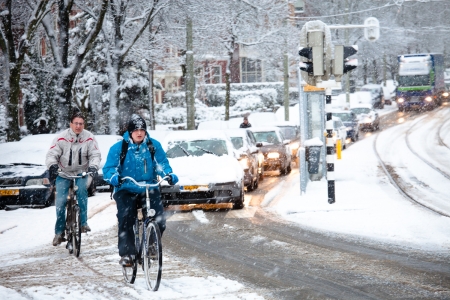Road users generally adjust their behaviour when out and about in adverse weather conditions, such as by choosing a lower driving speed or adapting their headway distance. However, the fact that in many adverse weather conditions crash risk is higher indicates that behavioural adjustments are not adequate.
There seem to be few recent studies on the effects of weather on driving behaviour. A review of studies from particularly the 1990s and early this century [25] indeed shows that drivers adjust their behaviour in rain, snow and fog. This mainly involves lower driving speeds. This is confirmed in a study on the speed effects of fog in the US [7] and of rain and snow in Sweden [26]. The latter study additionally found that the speed reduction during rain and snow was greater on roads with a higher limit: about 2.5% on roads with an 80 km/h limit to about 5% on roads with a 110 km/h limit. In all cases, speed reduction was greater in snow than in rain. Furthermore, speed reduction was often found to be greater in the dark, especially on roads without lighting.
In Korea, Woo and colleagues [14] report not so much lower speeds, but in particular greater speed differences when road users are blinded by the sun.
The research on headway distances in fog, as cited by Hamdar and colleagues [25], shows conflicting results, possibly related to two different driving styles: some studies report a greater distance in fog, others a smaller one, presumably because some drivers want to keep some kind of beacon or reference point in front of them.
Another way to adjust behaviour to bad weather conditions is to choose a different route [1]. When the weather is bad, road users may choose a route where the effect of bad weather is expected to be lower, for example by choosing the motorway instead of an unlit shortcut when it is dark and rainy, or by avoiding a road along a canal or waterway when it is slippery. We do not know to what extent this form of behavioural compensation occurs.
At a more strategic level, before they actually hit the road, many road users adjust their travel behaviour: by postponing a trip, choosing a different transport mode or destination, or cancelling the trip altogether [1].
